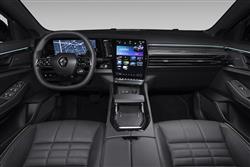Renault Austral E-Tech full hybrid - ABC Leasing
This is a sample, showing 30 seconds of each section.
WIZARD OF AUS?(some text hidden)
By Jonathan Crouch
Ten Second Review word count: 42
Renault's become a popular Hybrid brand, so it makes sense that this is the form in which we get the marque's sleek-looking C-segment SUV, the Austral. It's not premium, but it's not really mainstream either. It is though, a rather interesting all-rounder.
Background word count: 136
Britain is the biggest market for Hybrid cars in Europe. Didn't know that; probably you didn't either. Where that becomes significant is that it means we get models that otherwise we probably wouldn't have seen. Like this one, the Renault Austral. The Austral is the French maker's Qashqai-sized C-segment SUV, the follow-up to a Renault Kadjar model that sold so relatively poorly here that it originally wasn't going to be replaced. But the French marque needs a contender in this class and noted the warm reception given to self-charging full-Hybrid versions of the Clio and the Captur. Selling the Austral here with such an engine suddenly seemed to make sense. So it is we get this model - but only with that kind of engine. Let's take a closer look at the Austral E-Tech full hybrid.
Driving Experience word count: 349
Where its predecessor the Kadjar was not really much more than a re-skinned version of its Renault Nissan Alliance cousin the Nissan Qashqai, the Austral is rather more its own car. It has a slightly more electrified CMF-CD version of the CMF-C platform that underpins the Qashqai. And, surprisingly, it ignores that Nissan's clever semi-electric e-POWER engine technology too, opting instead for a self-charging full-Hybrid powertrain that Renault says delivers a better balance of speed, acceleration and efficiency. This is not the 1.6-litre four cylinder self-charging full-Hybrid set-up already used by Renault's Clio, Captur and Arkana models. Instead, it offers a lighter, more eager 1.2-litre three cylinder take on the same kind of technology that delivers a far more satisfying end result. And a surprising amount of power from such a small capacity set-up - 200hp. That means 62mph in 8.4s, which to give you some C-segment SUV full-Hybrid perspective, is a little faster than a Ford Kuga but a little slower than a Kia Sportage. Lots of other Renault Group engines will fit beneath the sculpted bonnet (principally the 1.3-litre 12V and 1.2 48V mild hybrid units from the Qashqai that make up the bulk of the Austral range in other markets), but no other units other than this rapid E-Tech Hybrid are being offered here. As with all full-Hybrids, the tiny size of the non-plug-in system battery means you won't go very far on EV power alone, but that's not really the point of HEVs, which instead use battery charge to enable to cut in and out more frequently in urban driving. A more unusual touch for a full-Hybrid in this class is the availability (at the very top of the range) of 4-wheel Steering. The '4CONTROL' system in question comes with a more sophisticated multi-link rear axle and at low speeds, the rear wheels turn by up to 5 degrees to facilitate a smaller turning circle - at just 10.1m, it's around the same as that of a Clio supermini. We can't see many Austral customers stretching for a version with this expensive feature fitted though.
Pictures (High res disabled)

.jpg)
.jpg)
.jpg)
.jpg)
.jpg)

Scoring
Category: Compact Car
| Performance | |
| Handling | |
| Comfort | |
| Space | |
| Styling | |
| Build | |
| Value | |
| Equipment | |
| Economy | 80% |
| Depreciation | 60% |
| Insurance | 60% |
| Total | 67% |